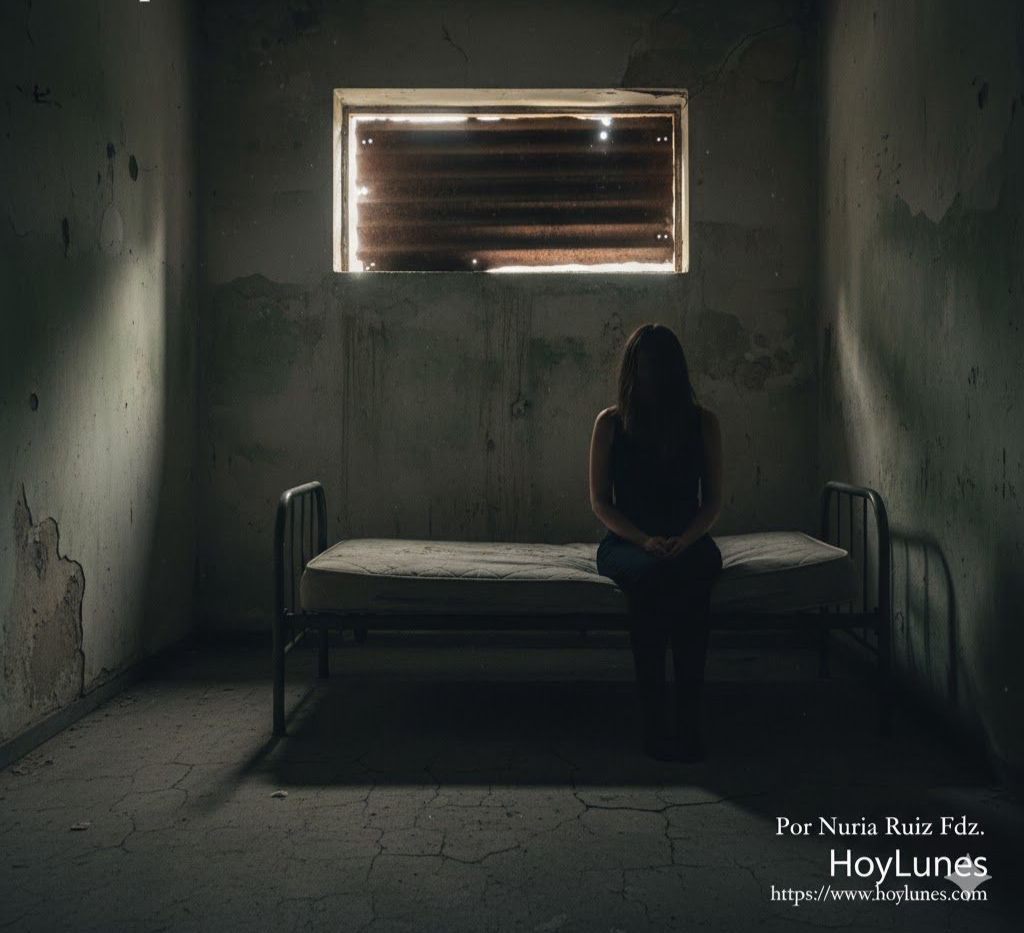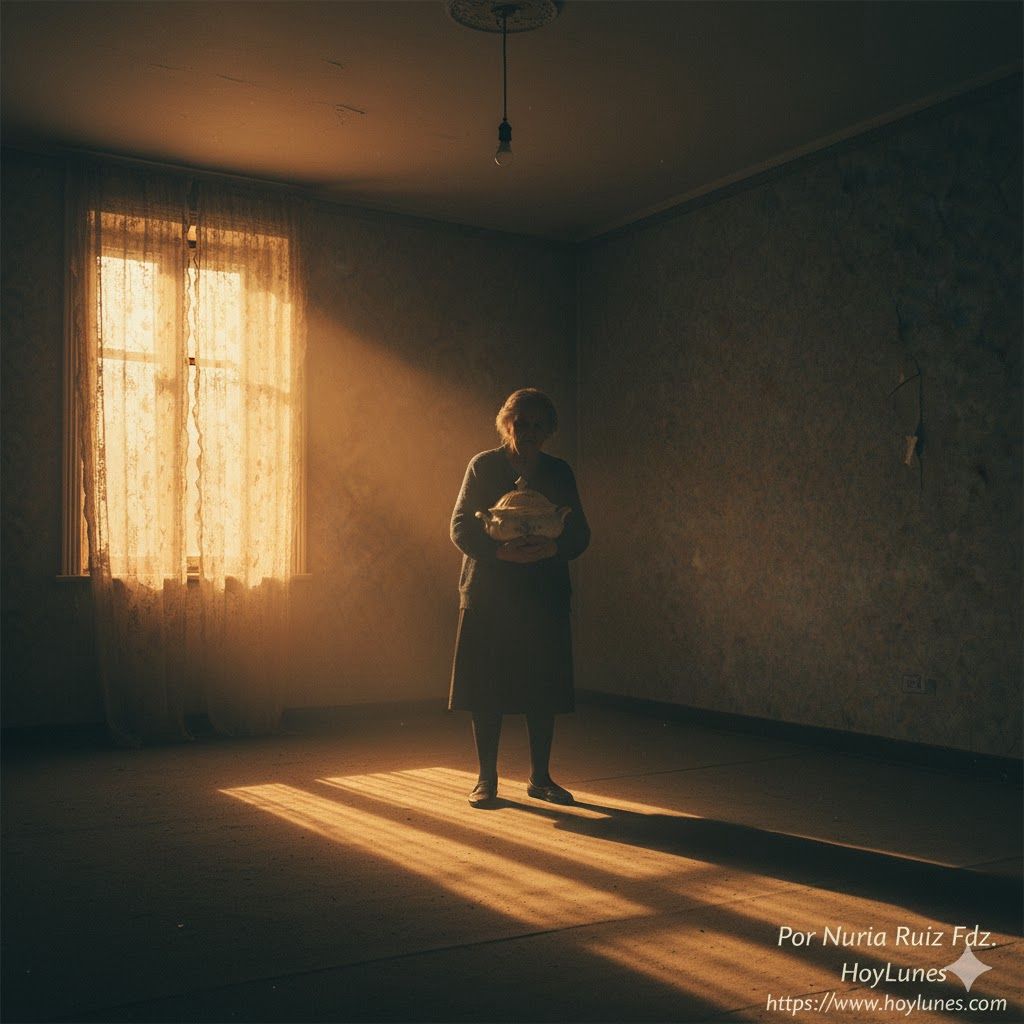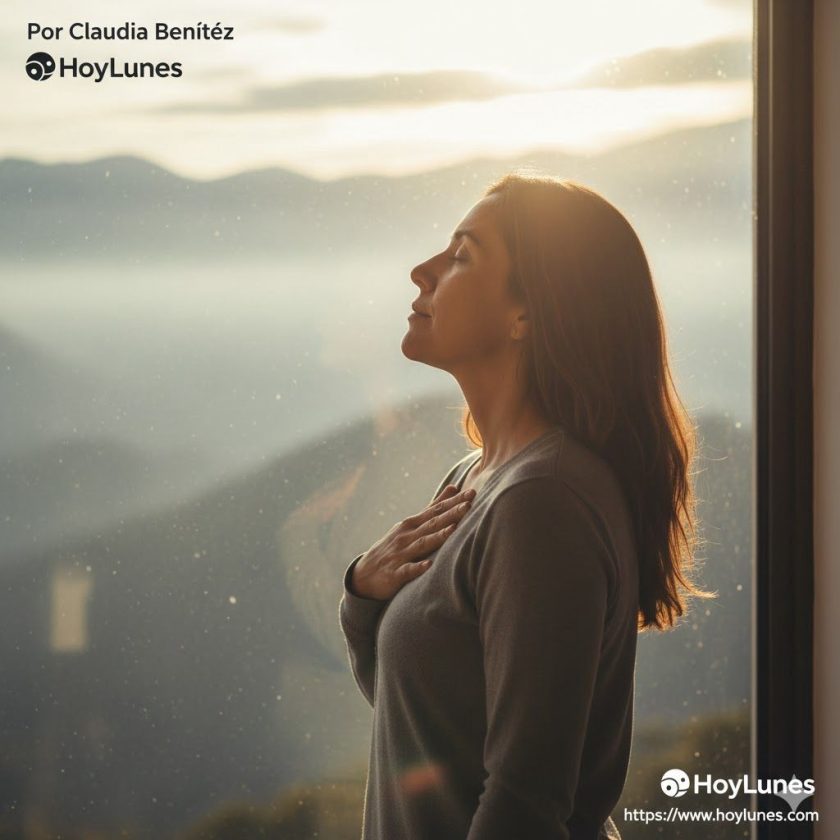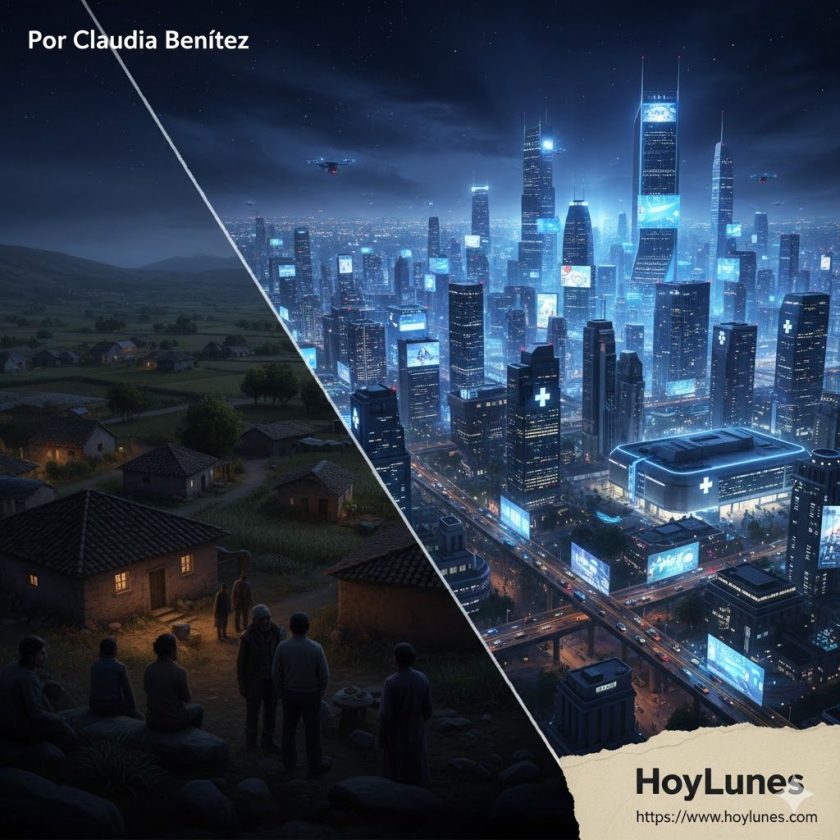In this sixth installment of “The Soup Tureen”, the story delves into the shadows of the Rock of Gibraltar. Lucía is torn from her home and confined between the murmur of the sea and the damp walls of a foreign house. From there, between threat and faith, the voice of a daughter tries to reach her mother. What once seemed a family story becomes a journey through guilt, memory, and the strength of the invisible bond that still unites them.
By Nuria Ruiz Fdez
HoyLunes – Summary — The Soup Tureen (I–V)
Margarita Lafuente tends a family soup tureen she inherited, which for her contains the very memory of her lineage: weddings, meals, farewells. A fire destroyed her home in León; she could only save the soup tureen, and the family moved south. In Guadarranque, her husband fell ill and died; the relationship with her daughter Lucía became tense until it broke: arguments, distance, Lucía’s desire to flee until she disappeared one night. Margarita found a note —“I’m going to find my future. Don’t follow me. Leave me alone.”— and, believing it was from her daughter, began to search for her.
Little by little, clues emerged: a red scarf on the shore, the feeling that the note didn’t fit (the handwriting wasn’t hers), and the presence of a young man, Youssef, Lucía’s friend, who claimed Lucía hadn’t left by choice: he had her notebook and habits that contradicted it. The police showed Margarita a photo: Lucía crossing the border into Gibraltar with a man whose profile revealed a tattoo on his shoulder. Youssef offered a contact in Gibraltar. In the family house, hidden in a trapdoor in the basement, there were packages of drugs; the family who had left the house (a cousin of the husband) didn’t know because it had long been abandoned. In chapter V, the kidnapping is revealed: Lucía is torn from her bed by two shadows in the night, the kidnappers leave the note on the table next to the soup tureen and throw her into the water in a boat bound for the Rock.
The Soup Tureen VI. The House of the Rock
The water split into two black tongues before the boat; the hull sliced the tide like a blade. Behind lay Guadarranque: scattered lights, the echo of a dog, the coast asleep like an exhausted body. The wind hit her face with that briny, metallic taste that belongs to bays with history; the engine vomited a smell that settled in her stomach. From the sea, the back of Gibraltar was nothing but a monumental shadow, an ancient, sleepless rock, standing watch.
When the boat turned toward the shore, the sea allowed itself to be tamed.
She woke with salt stuck in her throat and a faint ray of sun on the edge of her eyelids. She didn’t recognize that new smell: a mix of seaweed, stale gasoline, and something damp. The boat —the same that had brought her— slept on the sand, tilted like a defeated beast. They had docked on the beach of La Atunara: the horizon opened under a violet sky and the line of low, sea-washed houses seemed to hold back the wind. They were humble dwellings, white, with brightly painted doors and tiles; a neighborhood devoured by narrow alleys, facing the sea like someone staring at an uncertain future, its people watching from behind windows like those waiting for a love that never arrives.
She didn’t sense the presence until she saw it: one of the men —fair-skinned and almost white-haired, shaved at the sides— stood on the sand, leaning over her to check if she had awakened. Through half-open eyes she caught sight of a tattoo on his bare shoulder. Numbers and letters: 13-KT-04, as if someone had marked him like a box, not a person. He wore no mask. He wasn’t worried she could see him; there was in his gesture an irritating, reckless confidence.

He grabbed her by the arms, and like two lovers joined at the waist, he led her to a four-wheel-drive vehicle, pushed her inside, and drove off. They moved through a street where the houses seemed frozen in time, a time that for some perhaps had been better: low buildings, chipped paint on the walls, balconies with nets for drying fish. The house that received her belonged to the neighborhood: small, one-story, with a green iron door locked from the outside. The room where they locked her was damp and small, with a bed, a table, a spittoon, and a boarded-up window. The hallway smelled of stew. No one came in to speak with her, they abandoned her like a puppy in the middle of nowhere. Sometimes voices passed outside, words that sounded like work, children shouting in the street, the comings and goings of a normal family; inside, the tense stillness of captivity.
At night, the tattooed man opened the door and Lucía curled up on the bed.
“Here. Shawarma. Eat.” He threw a bag onto the floor.
“Tell me, why am I here?” She sat up. “You must have made a mistake, please let me go,” she begged, approaching him.
“Don’t approach.” He stopped her with a large hand in front of her face. “Eat. You’ll know soon.” And he locked the door behind him with three turns of the key.
Tears escaped her; one slipped between her lips, tasting of sea, and her stomach reminded her she was hungry. She devoured the shawarma as if it were her last, and with her mouth still full of yogurt sauce, tried to open the window, which, screwed tight with a metal plate, resisted until she collapsed exhausted.
The next day, the tattooed man, in one of the few times he spoke, took out a phone.
The conversation was brief; the voice on the other end sounded irritable and precise. The murmur reached Lucía like a small, electric wave.
“Yes, of course, la llevo, no problem, in this morning.” That half-Spanish, half-English speech slipped through the door.
The tattooed man entered and looked at her with a mixture of calculation and contempt:
“Only me, with you. Fewer eyes, fewer questions,” he said. “One wrong move and… your mother…”
He threatened her with a gesture of fingers across his own neck and grabbed her arm.
“Where are you taking me?” She tried to break free, kicking at his knees. “I’m not going anywhere with you!!!” The tattooed man slapped her so hard she fell to the floor. A thread of blood reached her ear; her cheek burned like live embers.
“Get up and shut up!”
The same SUV waited at the door; he shoved her inside. Lucía was paralyzed with fear; a drop of urine escaped down her legs. She couldn’t think or defend herself.
Within minutes, she saw the majestic outline of the Rock drawing closer. The SUV parked in front. They got out. She looked around —no one paid attention. She wanted to scream but didn’t dare. “I can’t let anything happen to my mother; I’ll have to obey until I find a better moment to escape —now is not the moment.” They crossed the border on foot. The tattooed man kept her by the waist, and something sharp pressed into her ribs.

They advanced through the pedestrian crossing with the calculated normality of those who don’t want attention: serious faces, plastic bags, distracted tourists. They crossed the border.
“ID, please,” a guard asked. The tattooed man, still holding her by the waist, pulled both IDs from his pocket with his free hand. Lucía looked at the officer with wide eyes, but he didn’t even raise his head, as if he knew who they were —or at least, that’s how it seemed to her. “He must be in on it; it can’t be that he didn’t even look up to check our documents. How far does this go?”
They got into an Audi, also with tinted windows. He covered her eyes again. The drive uphill was a sequence of curves and slopes until the city and the sound of the sea faded: English-style houses, façades facing Morocco, gardens trying to tame the breeze.
At one of those houses, the car stopped. The driver left without a word. The tattooed man and Lucía, pushed and blindfolded, went inside. In the living room he removed her blindfold. Lucía didn’t know where she was and tried to take in every clue: imported furniture with an Arab touch, the smell of wood, and a large window overlooking Morocco. He shoved her into a room with a canopy bed and windows that didn’t open, though light filtered through the wooden slats.
The confinement had changed in form but not in intent.
Lucía had lost count of the days. In the house of the Rock, time didn’t run; it seeped.
Outside, the sea crashed against the rocks with a prison’s monotony. The light entered obliquely through the windows. She slept in an upstairs room, with yellowed lace curtains and an oval mirror that returned a pale face, one increasingly foreign to her. At night she heard voices in the hallway —men arguing in English, Arabic, and that in-between dialect of two shores she barely understood.
The tattooed man —called Rafa the Blond— was the one who brought her food. Bread, cheese, sometimes tea. He never spoke more than necessary.
“When everything over, you go free,” he said one day, without looking at her.
“When it’s over what?” she asked.
But he was already gone.
Lucía began to suspect that the motive for the kidnapping wasn’t money, but something more tangled.
One afternoon, she overheard a conversation by the stairs:
“The hunt was marked,” said someone with a thick Andalusian accent. “The goods and the other thing were safe there. Nobody was supposed to go in. And then the girl and the mother show up.”
“The cousin didn’t know anything,” answered another, in Llanito dialect. “That house was abandoned of years.”
“Pooo, ya, no,” replied the Andalusian. “We got a problem.”
Lucía understood then: they hadn’t chosen her —she had stumbled upon them by chance. Her presence had exposed their hideout.
Four nights later, the man with the Llanito accent came to see her. He was impeccable, wearing a light linen jacket, leather shoes, and a gold watch that glimmered under the lamp. His movements carried the calm of one who commands without needing to impose.
“Are you tranquila? I hope yes,” he said.
Lucía didn’t answer.
“This could have been easy,” he continued, “but your mother moved too much. She went to the police. Spoke with people she shouldn’t. So now, you will help us fix it. All right?”
He took a cellphone from his inner pocket and handed it to her.
“Call your mother. Say she must leave the house, today, if not, the sea will take someone else.”
She had trouble understanding him; he spoke fast, the mix of languages disoriented her. Lucía looked at him with a mix of fear and rage.
“Why don’t you tell her yourselves?”
“Because she’ll believe only you,” he said, with a white smile and thin lips, sharp as a scalpel.
Lucía gripped the phone but didn’t dial yet.
“And if I don’t?”
The man leaned toward her. His eyes were gray, almost translucent.
“Then, when they find you, even she won’t recognize you.”
He said it in perfect Spanish, as if it were a line he had rehearsed.

Margarita, in those days, didn’t sleep. She had been to the police station in La Línea, shown a photo of her daughter with the blond tattooed man, heard what the friend had said —but something told her he knew more. She didn’t understand what was happening or why her daughter was with that man, but she knew for certain she hadn’t gone willingly. Youssef followed her everywhere in expectant silence.
When the phone rang that afternoon, the soup tureen on the table began to vibrate softly, as if it sensed what was coming.
Unknown number. Margarita answered without thinking.
“Lucía?” And her daughter’s voice came from a remote place —broken but alive.
“Mamá… listen to me…” Lucía’s voice was low, urgent, trembling between fear and haste. “You have to leave the house…” —At that moment, the Llanito man began lighting a cigar that kept going out— “Mamá… listen carefully…” she whispered, her words covered by the flick of the lighter.
Margarita held her breath.
“Lucía? Are you all right?” she asked, holding back tears.
“Yes… I am…” the girl hesitated. “I’m strong as a rock, you’re my lighthouse, and the tide is high.” Lucía’s voice faltered; she glanced sideways at the Llanito still struggling with the Zippo. “So… remember what I told you,” she whispered, “and leave that house, now!” she raised her voice.
Margarita frowned, confused, as the soup tureen seemed to tremble on the table, sharing the tension.
The call was cut off.
“What did you whisper?!” He snatched the phone from her hand without waiting for an answer and grabbed her by the neck. “If you said something you shouldn’t, you’ll never see her again.” His fingers tightened until she could barely breathe. “Understood? I hope your mother obeys and that the house is empty by tomorrow.” He returned to flawless Spanish.
Margarita stared at the soup tureen, pensive.
A trivial phrase, but enough to know she had to analyze it carefully. She pressed the soup tureen to her chest, as if she herself could contain the force of revelation: she knew Lucía had just given her the key to find her —but which one? The cold weight of the porcelain gave her strength.
“Don’t worry, my daughter…” Margarita whispered, almost to herself. “I’m going to find you.”

#hoylunes, #nuria_ruiz_fdez,



